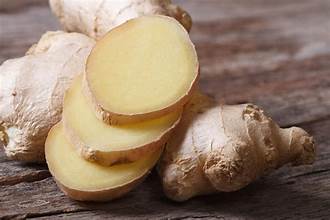Ginger and dried ginger, both carry numerous health benefits and are worth incorporating into your diet. However, if you’re dealing with any serious health condition or allergies, it’s essential to use them with caution. Consulting with a doctor is advisable for better guidance.
Understanding Ginger
Ginger, also known as Zingiber officinale, is a flowering plant belonging to the Zingiberaceae family. It is a root vegetable known for its spicy and pungent flavor, making it a popular ingredient in cooking. Besides, it’s recognized for its medicinal properties and has been used in traditional medicine for various ailments.
Fresh Ginger
Fresh ginger refers to the root of the ginger plant that hasn’t been dried or processed in any way. It has a thin, brownish skin and a firm, fibrous texture. Fresh ginger boasts a sharp taste and aroma, making it an essential component in many dishes, particularly Asian cuisines. It’s commonly used to make ginger tea or added to smoothies for its health benefits.
Dried Ginger
On the other hand, dried ginger, or ground ginger, is made by drying and grinding the root of fresh ginger, resulting in a fine powder. Compared to fresh ginger, it has a lighter yellow color and a more intense flavor. Dried ginger is often used in cooking and baking as a spice, and it also finds its place in traditional medicine.
Nutritional Variations
Fresh and dried ginger both offer various health benefits, but their nutritional profiles differ slightly due to different processing methods. Fresh ginger contains approximately 79% water, whereas dried ginger contains only about 10% water. This means that dried ginger is more concentrated in nutrients and calories due to its lower water content.
Fresh ginger is an excellent source of vitamin C, potassium, magnesium, and manganese. It also contains antioxidants like gingerol and shogaol, known for their anti-inflammatory properties. On the contrary, dried ginger is a good source of iron and dietary fiber. It contains higher levels of gingerol and shogaol compared to fresh ginger. Both fresh and dried ginger offer numerous benefits.
Health Benefits of Fresh Ginger
Relief from Nausea and Vomiting: Fresh ginger is known for its ability to reduce nausea and vomiting, particularly helpful during pregnancy or chemotherapy.
Anti-Inflammatory Properties: The compounds present in fresh ginger exhibit anti-inflammatory effects, making it beneficial for conditions like osteoarthritis and rheumatoid arthritis.
Improves Digestion: Fresh ginger contains enzymes that aid digestion and can help alleviate swelling, gas, and constipation.
Boosts Immune System: The high antioxidant content in fresh ginger helps boost the immune system, aiding in disease prevention.
Relieves Menstrual Pain: Studies suggest that consuming fresh ginger can help reduce the severity of menstrual cramps.
Health Benefits of Dried Ginger
Relief from Cold and Flu Symptoms: Dried ginger is often used to make ginger tea for its soothing effects on sore throat and cough.
Anti-Inflammatory Properties: The high concentration of compounds in dried ginger makes it more effective in reducing inflammation in the body.
Aids Weight Loss: The dietary fiber in dried ginger promotes satiety and can assist in weight loss by reducing calorie intake.
Controls Blood Sugar Levels: Research indicates that dried ginger can help regulate blood sugar levels in people with type 2 diabetes.
Pain Relief: The anti-inflammatory properties of dried ginger make it a popular remedy for headaches, muscle pain, and menstrual cramps.




